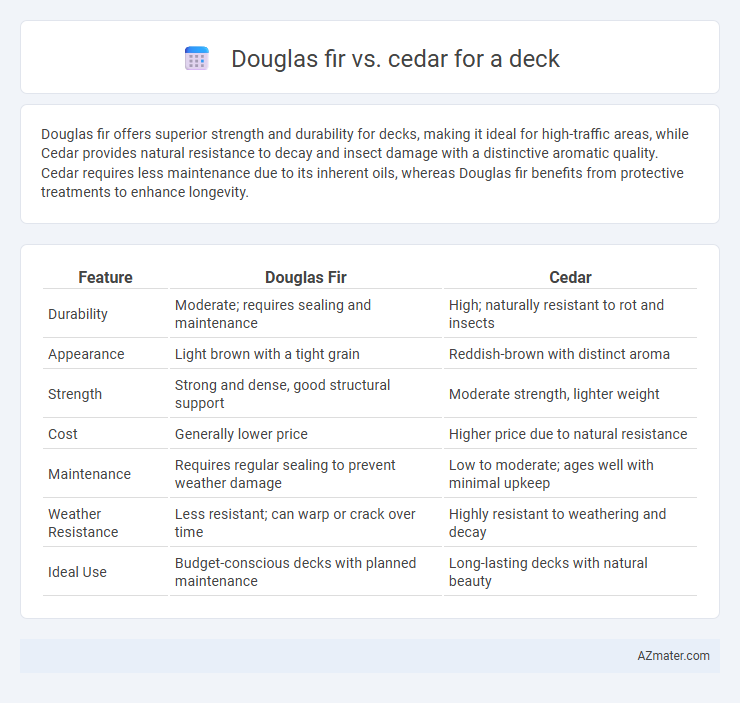Douglas fir offers superior strength and durability for decks, making it ideal for high-traffic areas, while Cedar provides natural resistance to decay and insect damage with a distinctive aromatic quality. Cedar requires less maintenance due to its inherent oils, whereas Douglas fir benefits from protective treatments to enhance longevity.
Table of Comparison
| Feature | Douglas Fir | Cedar |
|---|---|---|
| Durability | Moderate; requires sealing and maintenance | High; naturally resistant to rot and insects |
| Appearance | Light brown with a tight grain | Reddish-brown with distinct aroma |
| Strength | Strong and dense, good structural support | Moderate strength, lighter weight |
| Cost | Generally lower price | Higher price due to natural resistance |
| Maintenance | Requires regular sealing to prevent weather damage | Low to moderate; ages well with minimal upkeep |
| Weather Resistance | Less resistant; can warp or crack over time | Highly resistant to weathering and decay |
| Ideal Use | Budget-conscious decks with planned maintenance | Long-lasting decks with natural beauty |
Overview: Douglas Fir vs Cedar for Decking
Douglas fir offers exceptional strength and durability, making it a popular choice for structural decking supports, while cedar is prized for its natural resistance to decay and insect damage, ideal for visible decking surfaces. Cedar's lightweight and stable grain reduce warping and splitting compared to Douglas fir, which requires treatment to enhance weather resistance. Choosing between Douglas fir and cedar depends on the balance between structural needs and aesthetic longevity in outdoor decking projects.
Appearance and Aesthetics Comparison
Douglas fir offers a warm, reddish-brown hue with a straight, uniform grain that enhances a clean, modern deck aesthetic. Cedar features rich, reddish tones with natural knots and a more pronounced grain pattern, creating a rustic, textured appearance ideal for traditional or natural settings. Both woods develop a silver-gray patina over time, but cedar's color retention and resistance to fading provide longer-lasting vibrancy in deck aesthetics.
Durability and Lifespan
Douglas fir offers exceptional strength and moderate natural decay resistance, making it a durable choice for deck construction, especially when properly treated or sealed. Western red cedar naturally resists rot, decay, and insect damage due to its high concentration of natural oils, providing a longer lifespan with minimal maintenance in outdoor environments. Both woods perform well, but cedar generally outlasts Douglas fir in moist or harsh weather conditions, often extending deck lifespan by several years.
Resistance to Rot, Decay, and Insects
Douglas fir offers moderate resistance to rot, decay, and insects but requires treatment for prolonged durability in outdoor decking. Cedar naturally excels with high resistance to moisture, decay, and insect infestations due to its natural oils and dense grain, making it a preferred choice for long-lasting decks. Untreated cedar outperforms untreated Douglas fir in durability, resulting in extended maintenance cycles and better longevity in harsh weather conditions.
Maintenance Requirements
Douglas fir decks require regular sealing or staining every 1-3 years to protect against moisture and UV damage, while cedar decks benefit from natural resistance to decay and insects, reducing the frequency of maintenance. Cedar's stable wood resists warping and splitting better than Douglas fir, which demands more vigilant upkeep to avoid surface cracking and rot. Proper maintenance of Douglas fir involves sanding and refinishing to preserve aesthetics, whereas cedar can often maintain its appearance with only periodic cleaning and minor touch-ups.
Price and Cost Effectiveness
Douglas fir is generally more affordable than cedar, offering a cost-effective option for deck framing and structural components due to its widespread availability and fast growth rate. Cedar, while pricier, provides natural resistance to rot and insect damage, potentially reducing long-term maintenance costs. Considering initial investment and durability, Douglas fir delivers strong value for budget-conscious projects, whereas cedar suits those prioritizing longevity and minimal upkeep.
Environmental Impact and Sustainability
Douglas fir offers a sustainable decking option due to its rapid growth rate and widespread availability, resulting in lower environmental impact from forestry operations. Cedar, particularly Western Red Cedar, is naturally resistant to decay and pests, reducing the need for chemical treatments and preserving indoor and outdoor air quality. Both woods are renewable resources when sourced from responsibly managed forests certified by organizations like FSC, but Douglas fir generally provides stronger carbon sequestration benefits due to faster biomass accumulation.
Ease of Installation and Workability
Douglas fir offers excellent workability due to its straight grain and moderate hardness, making it easier to cut, nail, and shape for deck construction. Cedar's natural resistance to warping and splitting reduces installation challenges, but its softer texture requires careful handling to avoid dents and scratches. Both woods are relatively lightweight, but Douglas fir's uniform density allows for more precise fastening, expediting installation for professional and DIY projects alike.
Weather Resistance and Performance
Douglas fir offers strong structural performance but has moderate weather resistance, requiring regular sealing to prevent moisture damage and decay. Western red cedar naturally resists rot, insects, and moisture due to its high tannin content, making it ideal for outdoor decks with less maintenance. Cedar's dimensional stability and resistance to warping enhance longevity, while Douglas fir demands frequent upkeep to maintain durability under harsh weather conditions.
Best Use Cases: Which Wood to Choose for Your Deck
Douglas fir offers exceptional strength and durability, making it ideal for structural decking components and areas requiring high load-bearing capacity. Cedar boasts natural resistance to decay and insect damage, perfect for outdoor decks exposed to moisture and requiring low maintenance. For projects emphasizing longevity and weather resistance, cedar is preferred, while Douglas fir suits budget-conscious builds needing strong, stable wood.

Infographic: Douglas fir vs Cedar for Deck
 azmater.com
azmater.com